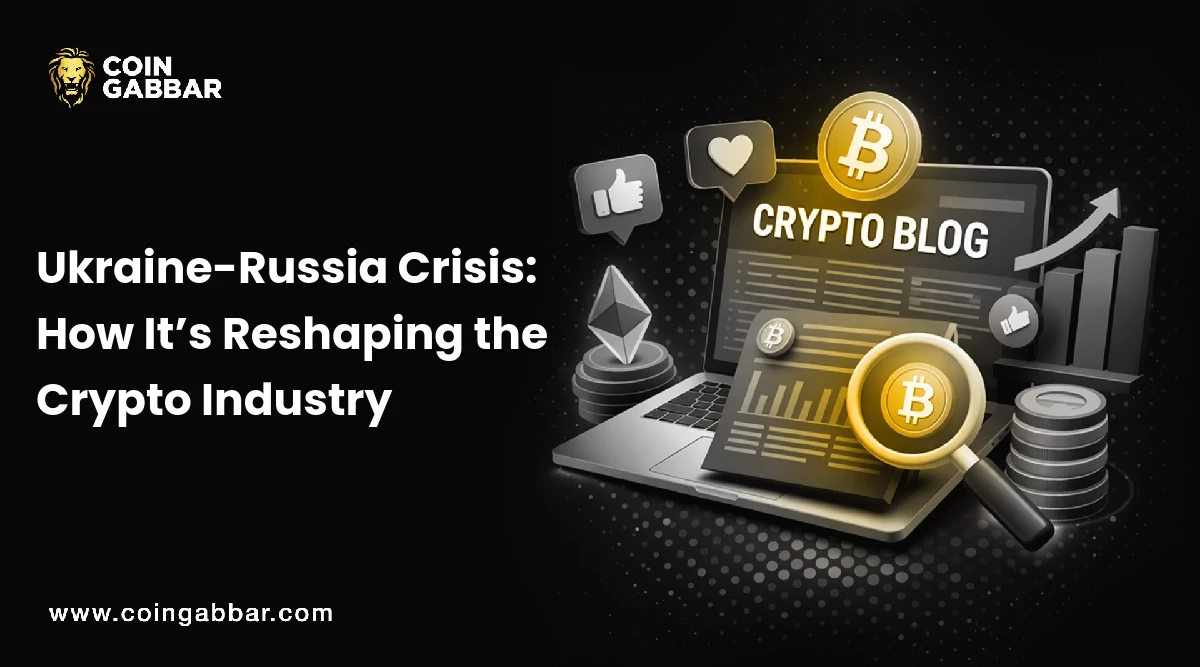
Introduction
Ukraine has been dragged into a war, and Ukrainian military troops have been fighting the Russian invasion for the past three months. This has consumed practically all of the Ukrainian government's financial resources and resulted in significant damage to public property. Despite the fact that Ukraine was receiving relief from all around the world, an announcement from Ukraine's Ministry of Digital Transformation drew the attention of the crypto community.
The Russian leader's primary goal was to overrun Ukraine and overthrow its government, thus putting a stop to Ukraine's desire to join NATO. After a month of setbacks, he abandoned his attempt to conquer Kyiv, Ukraine's capital, and focused his efforts on the country's east and south.
On the day of the invasion, Putin told the Russian people that his purpose was to "demilitarize and de-Nazify Ukraine." His stated goal was to safeguard individuals who had been subjected to what he described Ukraine's government's "eight years of bullying and mass genocide." Another goal was quickly added: maintaining Ukraine's neutral status.
Aftermath of the war said that it demanded US $100 million equivalent to ₹77 thousand crores (INR) was allegedly donated after a Ukrainian government official tweeted that the country would now accept the global help via bitcoin. Initially, two funds were established: one for humanitarian objectives and the other for military ones. However, when the violence worsened, the money was pooled and dedicated only to helping the Ukrainian military, with body armor, night vision goggles, helmets, medication, and food being purchased for frontline soldiers.
Although the sum received in cryptocurrencies is little in comparison to the overall monies awarded by foreign agencies, the government claims that it was able to acquire these payments considerably more promptly due to the lack of intermediaries.
The Russia -Ukraine war has catapulted the economy of the two countries by causing massive destruction in the upper Baltic region. Russia attacked Ukraine on the 24th of February, 2022 but the invasion is still going on with no sign of peace. Ukraine's army and the citizens are continuously facing direct threats from the Russian troops, which in effect is leading to worsening the economy in the entire region. On the other hand, the sanctions enforced on Russia by the USA have devastated its economy with its national currency Ruble falling more than 50%.
Russia started the war to depose the current Ukrainian government and win the capital Kyiv. But soon enough, Russia reverted its troops from Kyiv to liberate Ukraine's eastern regions namely Luhansk and Donetsk, collectively called Donbas.
Sanctions are among the most powerful measures available to the United States and European countries for affecting the conduct of countries that do not seem allies. Because the dollar is the world's reserve currency and is used in payments all across the world, the United States in particular uses sanctions as a powerful weapon in hand. However the potential use of cryptocurrencies to mitigate the impact of sanctions are intensifying their monitoring of digital assets. A government creates a list of persons and businesses that its citizens must avoid in order to impose sanctions. Anyone caught interacting with a member on the list will be fined severely. The global banking system, however, is the essential key to any effective sanctions policy.
This war between Russia and Ukraine is being fought in an unprecedented digital era. Both countries have accepted the new normal in this time of war and are getting help digitally from across the borders.
On one hand, Russia is trying to use the blockchain to evade the sanctions forced by the USA and its allied nations to regain the devastating financial and economic crisis within the country due to the impacts of war. These economic sanctions are the complete cessation of businesses, products, and services of the enemy countries. The USA has applied these sanctions even before to countries that are not in alignment with its POV. Moreover, it restricts its citizens and applies a penalty if they use any products from the sanctioned nations.
When critical infrastructure is out or there are concerns about how quickly something can get through a traditional banking system, as long as you have the internet and a computing device you can transact.
Ukrainian artist using NFT as an aid and relief.
On the other hand, Ukraine is using the blockchain to collect funds from around the world for the people facing the wrath of war. Artists and celebrities from different corners of the world are helping Ukraine anonymously by donating NFTs and cryptocurrencies in millions.
As the war rages on, Ukrainian artists posted self-portraits to become a symbol of resistance by Ukraine and its people. NFT artists from across the world have been sharing his photos to express their solidarity towards Ukraine.
They see it as a chance to express themselves in their raw state with their artistic pieces helping the country to emerge again through NFTs. That is why the country has turned at the times of atrocities to the side of crypto.
Not only the Ukrainian government, but also a decentralized autonomous organization (DAO) was founded to help resistance and generate funds for Ukrainian forces fighting the Russian army.
UkraineDAO, a crowdfunding campaign organized by Please DAO, NFT studio Trippy Labs, and the Russian art collective Pussy Riot, has already raised over $3 million in Ethereum-based tokens.
Ukraine's cryptocurrency law comes as governments across the world debate how to regulate the industry, with results that are often in diverging ways.
Ukraine has begun taking donations in digital currencies such as bitcoin and ether for its military defense against Ruswhat-is-daossia. According to blockchain analytics firm Elliptic, it has now extended the amount of cryptocurrencies it takes for donations and has raised over $63 million, over 472 crores.
The "world's youngest crypto millionaire" has given a huge donation to Ukraine's humanitarian efforts. On April 4, Buterin transferred 750 Ether to the Help for Ukraine initiative, which was established by the Ukrainian government, and another 750 Ether (in two transactions of 250 Ether and 500 Ether) to the Unchain Fund, a nonprofit established to provide humanitarian aid to Ukraine.
Ukraine's government opened an official website earlier this week where individuals all around the world may donate using bitcoins. The funds will be used to support Ukraine's military and humanitarian missions.
Crypto aficionados see bitcoin as "digital gold," a handy place to store cash during war or disaster. Bitcoin, the argument goes, has a limited supply and runs on a global computer network beyond the reach of governments and is therefore safer than traditional currencies.
Rouble routed, bitcoin bounces, Crypto trading in Russia has soared as the rouble was battered by Western sanctions which aim to squeeze Russia's economy and sever it from the global financial system. Russian oligarchs have supported and acted as a big influencer for russia.
The statistics indicated that rouble-denominated trades using Tether, a stablecoin meant to maintain a constant value — reached 3.3 billion roubles on Monday, the biggest this year and nearly five times more than a week earlier.
According to the data, Oligarchs has been indulging and converting a lot of their wealth to cryptocurrency.The war has made a lot of change in the narrative that crypto currency is not just a speculative asset, it is also a seizure-resistant, policy-independent, longer-term store of value.
All of us are witnessing a steep surge in the adoption of cryptocurrency as a cross-border currency. With the internet reaching even the remotest areas of the world, the scale of this adoption is only going to increase. However, crypto has been on the central stage of DeFi for a long period of time and that stage is growing big enough to accommodate new trends and developments. In the Ukraine-Russia war, we could witness the rise of NFTs as a driving force for resistance and revolt against the Russian war atrocities. This rise does not seem to be a mere trend and gives a strong signal about the scope of NFTs in the upcoming future.
The Ukrainian government has been able to harness the sentiments of the people across the world and took a step forward by accepting donations in cryptocurrencies and NFTs. This could be a case study for other nations and can become the reason for the mass recognition of NFTs.
NFT and care the solutions, but they also involve risks that can not be ignored. Russia is implementing blockchain to escape the sanctions and, on the other hand, Ukraine is seeking help in terms of these. The war has been impacting countries, the world geographically, and the economy of the countries involved in the conflict. However, no matter what peace must sustain in the region to ensure economic safety for the entire world.

Pankaj Gupta is an accomplished Hindi Blog Writer and Chartered Accountant associated with Coin Gabbar, where he specializes in creating educational and impactful content on cryptocurrency, blockchain, and finance. His strong financial background and analytical mindset help bridge the gap between traditional finance and the evolving digital asset industry. Pankaj’s work reflects a commitment to simplifying complex ideas and delivering practical insights to readers. Outside of writing, he is passionate about reading, investing, trading, traveling, and philosophy, which continuously inspire his thought process and enhance the depth of his content.
10 months ago
News on crypto lending

10 months ago
New cryptocurrency releases
